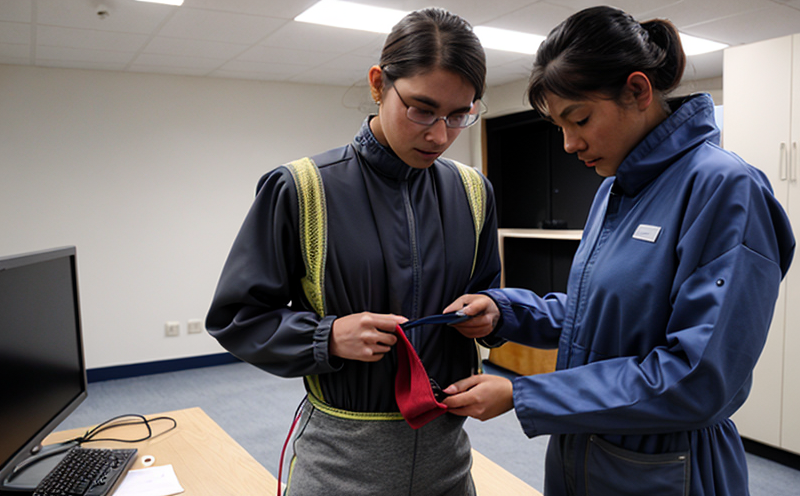Performance of smart textiles with integrated sensors
The performance evaluation of smart textiles that incorporate integrated sensing technologies is a specialized area within textile testing. This service focuses on ensuring that these innovative materials meet the stringent requirements set by industries such as healthcare, automotive, aerospace, and consumer electronics. Smart textiles are designed to monitor various parameters, including temperature, humidity, strain, pressure, and other environmental factors, which can provide real-time data to enhance user experience and improve product performance.
The testing of smart textiles involves a comprehensive approach that covers multiple aspects such as electrical conductivity, mechanical integrity, thermal stability, and biocompatibility. Electrical conductivity tests ensure the sensors within the textile are operational and capable of transmitting accurate data. Mechanical integrity tests assess the durability and flexibility of the integrated sensing elements under various stress conditions. Thermal stability evaluations verify the materials' ability to withstand temperature changes without compromising sensor performance.
Biocompatibility testing is crucial for healthcare applications, ensuring that the textile does not induce adverse reactions when in contact with human skin. Compliance with international standards such as ISO 10993-5 (biocompatibility evaluation) and ASTM F2090 (electrical safety of textiles used on or near the body) adds credibility to these tests.
Specimen preparation for smart textile testing requires precision to ensure accurate results. The specimens are cut into standard sizes that represent typical usage in real-world applications. For instance, in automotive seat covers, small patches might be tested to simulate wear and tear over time. In healthcare gowns, larger pieces may be used to replicate the gown's overall structure.
The instrumentation used for these tests includes advanced scanning electron microscopes (SEM) for analyzing sensor integration at a microscopic level, impedance analyzers for measuring electrical properties, and high-precision strain gauges for mechanical stress analysis. Data collected from these instruments is then analyzed using sophisticated software to generate comprehensive reports that detail the performance metrics of the smart textiles.
Understanding the real-world applications of smart textiles helps in tailoring tests to specific scenarios. For instance, in sports apparel, sensors might be evaluated under dynamic movements like running or jumping. In industrial safety wear, static conditions and sudden impacts need to be considered during testing.
Benefits
- Enhanced Product Quality: Ensures that smart textiles meet the highest standards of performance, reliability, and durability.
- Informed Decision-Making: Provides data-driven insights to guide product development and improve user experience.
- Compliance Assurance: Helps clients ensure their products comply with relevant international standards, enhancing marketability.
- Cost Savings: Identifies potential issues early in the design phase, reducing rework costs and time-to-market delays.
The ability to test smart textiles accurately and efficiently is essential for maintaining competitive advantage. By leveraging cutting-edge technology and adhering strictly to industry standards, we provide clients with reliable testing results that contribute positively to their brand reputation.
Customer Impact and Satisfaction
The performance of smart textiles plays a pivotal role in customer satisfaction across various sectors. In healthcare, for instance, accurate monitoring through integrated sensors can lead to better patient care and early intervention. This not only improves health outcomes but also reduces healthcare costs. For automotive manufacturers, reliable smart textiles ensure the safety and comfort of drivers and passengers by providing real-time data on vehicle conditions.
For R&D engineers, these tests offer valuable feedback that helps refine product designs, leading to innovations that meet evolving market demands. Procurement teams benefit from this service as they can make informed decisions about suppliers who deliver high-quality smart textiles. The comprehensive reports generated during these tests serve as a benchmark for quality assurance processes.
By focusing on the performance of smart textiles with integrated sensors, we empower our clients to stay ahead of competitors by offering superior products that meet stringent regulatory requirements and consumer expectations.
Competitive Advantage and Market Impact
- Innovation Leadership: By staying at the forefront of smart textile testing, we help clients innovate faster and more effectively.
- Better Reputation: Superior quality and compliance with international standards enhance a brand's reputation in competitive markets.
- Higher Customer Loyalty: Products that perform reliably and meet user needs consistently build long-term customer relationships.
- Precise Data for Decision-Making: Accurate test results enable informed decisions, which can lead to strategic advantages over competitors.
The impact of our services extends beyond individual clients. By promoting the use of high-quality smart textiles, we contribute to industry-wide improvements in product performance and safety standards. This collective effort helps drive innovation across sectors, ultimately benefiting consumers worldwide.





